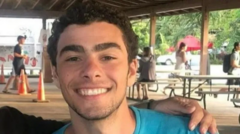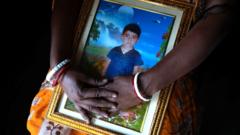In the wake of UnitedHealthcare CEO Brian Thompson's murder in New York City, a peculiar fandom has emerged for his accused killer, Luigi Mangione. He has been romanticized online, exposing deep-rooted frustrations directed at the American healthcare system. Critics warn that this glorification of violence is alarming and signals a disturbing trend in societal attitudes towards crime and justice.
The Dark Obsession: How a Healthcare CEO’s Murder Sparked a Fandom for His Accused Killer

The Dark Obsession: How a Healthcare CEO’s Murder Sparked a Fandom for His Accused Killer
The murder of UnitedHealthcare CEO Brian Thompson has ignited a troubling fan culture around his alleged assailant, raising questions about America's healthcare system and societal anger.
In the aftermath of the shocking murder of UnitedHealthcare CEO Brian Thompson on December 4, the streets of New York City saw a bizarre reaction – a lookalike contest for the man accused of his killing. Young men gathered in Washington Square Park, donning hoodies and masks, to humorously compete for the title of "Luigi Mangione lookalike," the alleged shooter who has become an unexpected sensation on social media.
Talia Jane, a journalist present at the event, noted that while the turnout was sparse and the atmosphere was light-hearted, it highlighted a peculiar obsession that has captivated many online following the murder of Thompson. This obsession, she argued, taps into a larger undercurrent of resentment toward America's private healthcare system – discontent that had been boiling under the surface and found an igniter in this high-profile case.
The profile of the alleged murderer, a 26-year-old Ivy League graduate, has drawn both fascination and concern. On platforms like TikTok and Instagram, Mangione has garnered attention, with many users portraying him as a "folk hero" fighting against corporate greed. Videos labeled the "CEO assassin" have proliferated, and the hashtag #EatTheRich has gone viral in the wake of the incident.
Amid this fervor, Mangione's physical appearance has drawn attention; dubbed the "hot assassin," societal standards of beauty play a troubling role in this fandom. Cultural critic Blakely Thornton noted that the Internet's focus often leans towards admiration instead of moral judgment, creating a dangerous romanticization of criminals.
While social media has enabled this fan culture to thrive, it underscores a concerning trajectory toward normalizing politically motivated violence. Alex Goldenberg from the Network Contagion Research Institute remarked on the implications of such sentiments becoming mainstream, likening the situation to similar reactions seen in less publicized incidents of violence.
Public reaction to the shooting has also seen a surge in anti-corporate sentiment, with calls for accountability against healthcare providers appearing in both online campaigns and physical protests, igniting a firestorm around issues of healthcare equity. A significant portion of Americans vent their frustrations online, with studies revealing that nearly half of insured adults have faced unexpected healthcare costs or denied coverage.
Brian Thompson, remembered by colleagues and clients as a dedicated leader, has become a sidelined figure in the frenzy surrounding his murder, prompting critics to highlight the need for a more balanced discourse that honors the victim alongside discussions about systemic reform. Thompson's friends remember him as "one of the good guys," emphasizing that the complexity of the event goes beyond the polarizing figures of the healthcare debate.
As the narrative around this tragedy unfolds, questions linger about the limits of fandom in the age of social media—where lines blur between admiration and accountability, often sacrificing the humanity of those directly affected.





















